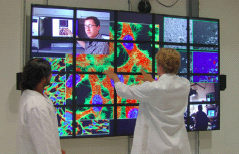Real-time Multi-scale Brain Data Acquisition, Assembly, and Analysis using an End to End OptIPuter
October 1st, 2006
Categories: Applications

Authors
Singh, R., Schwarz, N., Taesombut, N., Lee, D., Jeong, B., Renambot, L., Lin, A., West, R., Otsuka, H., Peltier, S., Martone, M., Nozaki, K., Leigh, J., Ellisman, M.About
At iGrid 2005 we demonstrated the transparent operation of a biology experiment on a test-bed of globally distributed visualization, storage, computational, and network resources. These resources were bundled into a unified platform by utilizing dynamic lambda allocation, high bandwidth protocols for optical networks, a Distributed Virtual Computer (DVC), and applications running over the Scalable Adaptive Graphics Environment (SAGE).
Using these layered technologies we ran a multi-scale correlated microscopy experiment, where biologists imaged samples with scales ranging from 20X to 5000X in progressively increasing magnification. This allows the scientists to zoom in from entire complex systems such as a rat cerebellum to individual spiny dendrites. The images used spanned multiple modalities of imaging and specimen preparation thus providing context at every level and allowing the scientists to better understand the biological structures.
This demonstration attempts to define an infrastructure based on OptIPuter components which would aid the development and design of collaborative scientific experiments, applications and test-beds and allow the biologists to effectively use the high resolution real estate of tiled displays.
Resources
Citation
Singh, R., Schwarz, N., Taesombut, N., Lee, D., Jeong, B., Renambot, L., Lin, A., West, R., Otsuka, H., Peltier, S., Martone, M., Nozaki, K., Leigh, J., Ellisman, M., Real-time Multi-scale Brain Data Acquisition, Assembly, and Analysis using an End to End OptIPuter, Future Generation Computer Systems, vol 22, no 8, Elsevier, pp. 1032-1039, October 1st, 2006.